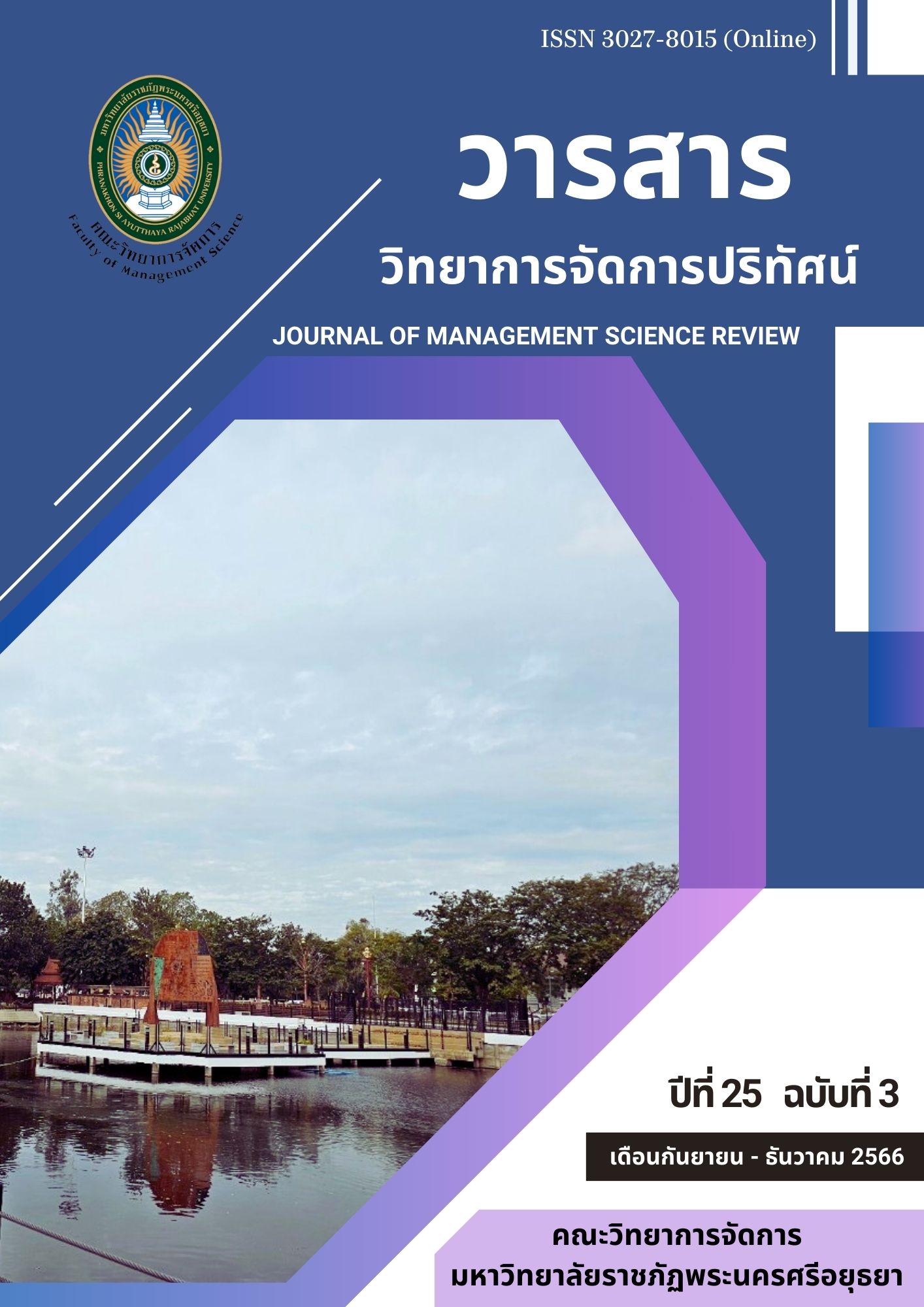The Influence of Job Crafting on Job Performance of Information Technology Employees in Private Company in Bangkok
Keywords:
Job Crafting, Work Engagement, Work Passion, Employee Creativity, Job PerformanceAbstract
This research aimed 1) to study the establishment of job crafting, work engagement, work passion, and employee creativity on job performance; 2) to examine the establishment of job crafting, work engagement, work passion, and employee creativity on job performance; and 3) to study job crafting, work engagement, work passion, and employee creativity on job performance as the mediators on the relationship between job crafting and job performance of employees. The research was quantitative, utilizing questionnaires as research tools, and the sample group comprised 380 Information Technology employees in private companies in Bangkok. Statistical analysis was performed using structural equation modeling, and the results were summarized into a statistical model. The examination of data validity revealed the following indices: CMIN/df = 2.113, GFI = 0.917, CFI = 0.971, RMR = 0.030, RMSEA = 0.054, RMR = 0.047. The results showed that the eight hypotheses were supported by job crafting, work engagement, work passion, and employee creativity were found to have a positive relationship with the work performance of employees. Therefore, the research implications will be the guideline for the executive and the human resources department to build the employees’ work motivation and passion to increase the job performance of employees in the organization.
References
Armstrong, M. (2010). Armstrong's handbook of reward Management practice: Improving performance through reward. Kogan Page Publishers.
Berg, J. M., Dutton, J. E., & Wrzesniewski, A. (2013). Job crafting and meaningful work. In B. J. Dik, Z. S.
Byrne, & M. F. Steger (Eds.), Purpose and meaning in the workplace (pp. 81–104).
https://doi.org/10.1037/14183-005
Chen, P., Lee, F., & Lim, S. (2020). Loving thy work: Developing a measure of work passion. European
Journal of Work and Organizational Psychology, 29(1), 140-158.
Chong, E., & Ma, X. (2010). The influence of individual factors, supervision and work environment on
creative self‐efficacy. Creativity and Innovation Management, 19(3), 233-247.
Cronbach, L. J. (1951). Coefficient alpha and the internal structure of tests. Psychometrika, 16(3), 297-
Ebrahimi, E. (2021). The Relationship between Living a Calling and Job Crafting: The Moderating Role of
Job Passion. Transformation Management Journal, 12(2), 1-20.
Fernández-del-Río, E., Koopmans, L., Ramos-Villagrasa, P. J., & Barrada, J. R. (2019). Assessing job
performance using brief self-report scales: The case of the individual work performance questionnaire. Revista de Psicología del Trabajo y de las Organizaciones, 35(3), 195-205.
Fornell, C. & Larcker, D.F. (1981). Evaluating Structural Equation Models with Unobservable Variables
and Measurement Error. Journal of Marketing Research, 18(1), 39-50.
Hair, J.F., Black, W.C., Babin, B.J., & Anderson, R.E. (2010). Multivariate Data Analysis. 7th Ed..
New York: Pearson.
Ince, H., Imamoglu, S. Z., & Turkcan, H. (2022). Relationships among absorptive capacity, creativity and
job performance: the moderating role of social media usage. Management Decision, 60(3), 858-882.
Kline, R. B. (2011). Principles and practice of structural equation modeling. 3rd ed. New York: Guilford.
Leiter, M. P., & Bakker, A. B. (2010). Work engagement: introduction. Work engagement: A handbook of
essential theory and research, 1(9).
Li, J. B., Leung, I. T. Y., & Li, Z. (2021). The pathways from self-control at school to performance at work
among novice kindergarten teachers: The mediation of work engagement and work stress. Children and youth services review, 121.
Li, N., & Ding, M. (2022). The Influence of Paradoxical Leadership on Adaptive Performance of New-
Generation Employees in the Post-Pandemic Era: The Role of Harmonious Work Passion and Core Self-Evaluation. Sustainability, 14(21).
McAllister, C. P., Hochwarter, W. A., Harris, J. N., Perrewé, P. L., & Ferris, G. R. (2017). A multi-sample
constructive replication of perceived resource availability’s role in work passion–job outcomes relationships. Journal of Business and Psychology, 32, 147-164.
Moon, T. W., Youn, N., Hur, W. M., & Kim, K. M. (2020). Does employees’ spirituality enhance job
performance? The mediating roles of intrinsic motivation and job crafting. Current Psychology, 39, 1618-1634.
Motowildo, S. J., Borman, W. C., & Schmit, M. J. (1997). A theory of individual differences in task and
contextual performance. Human performance, 10(2), 71-83.
National Statistical Office. (2021). The people working in the Information and Communication
Technology 2021. from http://www.nso.go.th/sites/2014/DocLib1/2564/ict_worker_64.pdf
Nguyen, H. M., Nguyen, C., Ngo, T. T., & Nguyen, L. V. (2019). The effects of job crafting on work
engagement and work performance: A study of Vietnamese commercial banks. The Journal of Asian Finance, Economics and Business, 6(2), 189-201.
Nykolaiszyn, J. M. (2022). The impact of job crafting and work engagement on academic librarians before
and during the COVID-19 pandemic. The Journal of Academic Librarianship, 49(3), 102697.
Petrović, I. B., Vukelić, M., & Čizmić, S. (2017). Work engagement in Serbia Psychometric properties of
the Serbian version of the Utrecht Work Engagement Scale (UWES). Frontiers in psychology, 8, 1799.
Pitafi, A. H., Khan, A. N., Khan, N. A., & Ren, M. (2020). Using enterprise social media to investigate the
effect of workplace conflict on employee creativity. Telematics and Informatics, 55.
Vallerand, R. J. (2015). The psychology of passion: A dualistic model. Series in Positive Psychology.
Saleem, S. T., & Adeel, A. (2016). Strategic human resource management and employee creativity: The
role of leadership style and knowledge management capacity. In Information and Knowledge Management, 6(6), 53-69.
Schaufeli, W. B., Bakker, A. B., & Salanova, M. (2006). The measurement of work engagement with a
short questionnaire: A cross-national study. Educational and psychological measurement, 66(4), 701-716.
Siddiqi, H., & Qureshi, M. (2016). The impact of employees’ creativity on the performance of the firm.
Research issues in social sciences, 1(1), 1-16.
Wang, Y., & Lau, D. C. (2022). How and why job crafting influences creative performance? A resource
allocation explanation of the curvilinear moderated relations. Asia Pacific Journal of Management, 39(4), 1561-1587.
Zhang, M., Wang, F., & Das, A. K. (2020). Work–family conflict on sustainable creative performance: Job
crafting as a mediator. Sustainability, 12(19).





